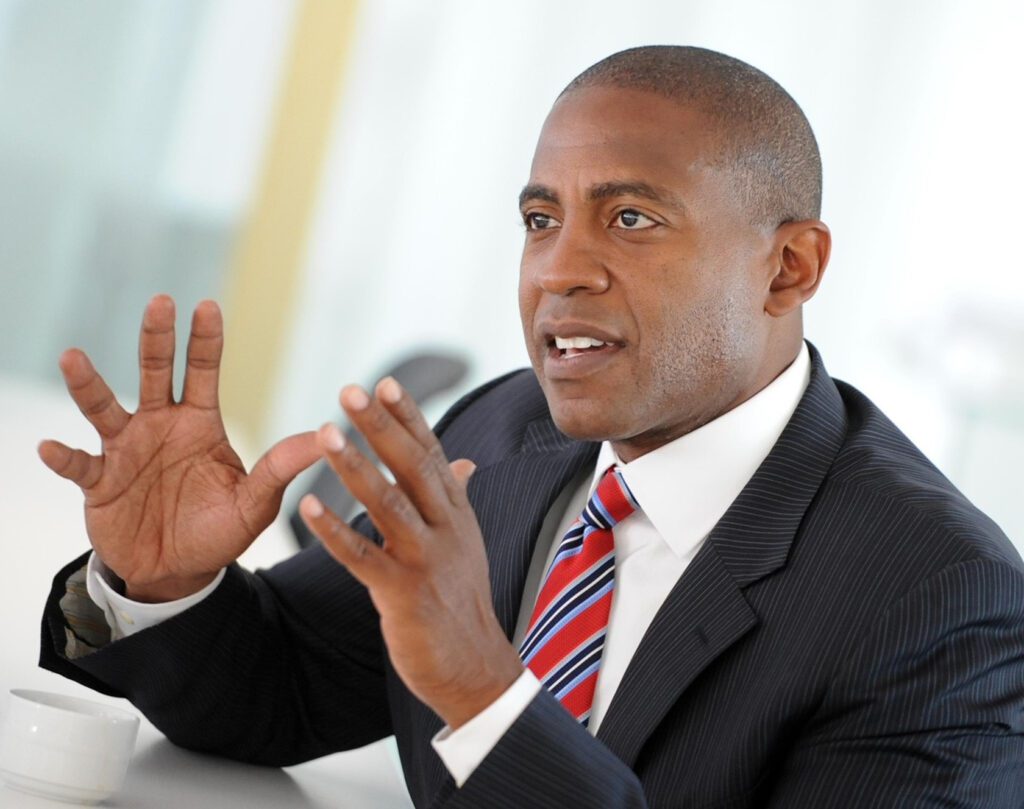Carlos Watson convicted amidst bias claims
Denies charges and questions prosecution’s conduct

Ozy Media founder Carlos Watson was convicted in a federal court last week of fraud charges after a trial that was marred, according to defense counsel, by repeated breaches of judicial fairness by the presiding judge.
Watson, 54, a Harvard College and Stanford Law graduate, was immediately taken into custody after U.S. District Judge Eric Komitee revoked his bail at the Brooklyn federal courthouse.
Defense attorney Ronald S. Sullivan Jr., a Harvard Law professor, objected, saying his client was not a flight risk. Watson’s family members vocally protested as the defendant was led away.
Watson, also convicted of aggravated identity theft in connection with an Ozy executive’s impersonation of a senior manager from YouTube, faces 37 years in prison. Sentencing is scheduled for Nov. 18.
Watson, a former MSNBC host, founded Ozy Media as a digital media start-up in 2013, publishing newsletters and producing podcasts before expanding into festivals and feature interviews with such celebrities as John Legend and Hillary Clinton. Ozy and its flagship “The Carlos Watson Show” attracted viewers and subscribers and became the target of takeover offers.
But all that came crashing down after a series of 2021 New York Times articles alleged that Watson inflated revenue and subscriber numbers in order to stay financially afloat and was complicit in a scheme to fool Goldman Sachs through the impersonation of a YouTube executive by an Ozy colleague in a conference call.
Watson denied the charges and challenged the underlying integrity of the prosecution, saying he was being singled out because of prosecutorial bias against Black defendants and because society holds successful African American business leaders to a double-standard.
Watson also sued Ben Smith, the author of the New York Times stories, saying that as a former executive and ongoing investor at the competing BuzzFeed Smith was in a position to benefit from Ozy’s demise.
The eight-week trial produced a highly unusual complaint from the two defense counsels as well as a witness concerning the judge’s behavior during the proceedings.
“One need only sit in this courtroom one day to see and hear much of the behavior and bias complained of in this letter,” wrote Sullivan to Judge Komitee.
“From the court’s pro-government bias to the racial dynamics in this courtroom (including the audience), a reasonable person’s confidence in the administration of justice will be shaken.”
According to Sullivan, the judge’s disparaging remarks to the all-Black defense team sent a message to the jury and the courtroom that the defense’s arguments are less worthy of consideration.
Sullivan, who argued in a pre-trial motion that the prosecutorial team’s record of disparate charges against Black defendants disqualified them from proceeding with the case, said the judge’s previous service with the team led him to groom and coddle the prosecution at every turn in the trial to the detriment of Watson. The court sustained objections never made by the prosecution, asked questions meant to bolster the prosecution’s case, and made biased evidentiary rulings, argued Sullivan.
The prosecution’s case strongly rested on the testimony of former Ozy chief operating officer Samir Rao and former chief of staff Suzee Han, who both pleaded guilty last year and cooperated with the government. Rao said his efforts to boost Ozy’s standing through the YouTube ruse as well as create a fake contract were done with Watson’s guidance.
Watson said Rao, operating with a severe mental condition, acted alone as he was too busy producing content to oversee day-to-day financial management of the company.
Taking the stand in his own defense, Watson denied any conspiracy to fool investors and pushed back on testimony from Google chief executive officer Sundar Pichai, that he had never discussed a $600 million takeover of Ozy. Prosecutors said Watson bragged about the offer to an investor, but the Ozy CEO denied ever having made that claim.
In their appeal, defense counsel are expected to revisit many of the accusations made in their letters while the trial was underway.
“In instance after instance, the court has put its thumb on the scale of justice by providing inappropriate assistance to the prosecution, undermining the credibility of the defense team, and through rulings that have reflected a disturbing bias,” wrote Frison to Komitee.
According to the letter, the judge consistently demeaned defense counsel in front of the jury, assisted the prosecution in personally objecting to defense testimony and showed bias in requiring the defense to discuss in detail its plan for witnesses the day before testimony while placing no such burden on the prosecution.
“The court’s repeated indications of impatience and displeasure with defense counsel of their questions jeopardize Mr. Watson’s right to a fair trial,” said Frison.
In a separate letter to the chief judge who heads the Eastern District of New York bench, finance expert David T. Robinson said Judge Komitee exhibited judicial bias throughout his day on the witness stand, reframing questions for the prosecution and showing rampant disdain for the defense.
Robinson said that the context of hostile questions from the bench, his tone of voice as well as other non-verbal cues “suggested to me that he looked on the defendant with suspicion but did not look upon the prosecution with similar suspicion.”
“My concern is that the behavior I saw in court deprives the accused of a fair trial by limiting his counsel’s ability to mount a defense,” wrote Robinson.
Watson, a Miami native who went from growing up on food stamps to the Ivy League, enjoyed success in business and nonprofit work after college, running a mentorship program for poor kids from East Palo Alto and consulting with McKinsey.
Though based in Silicon Valley, Watson and Ozy were prosecuted in Brooklyn. His family and friends were an enduring presence throughout the long trial, seen gathering in prayer outside the courthouse.






